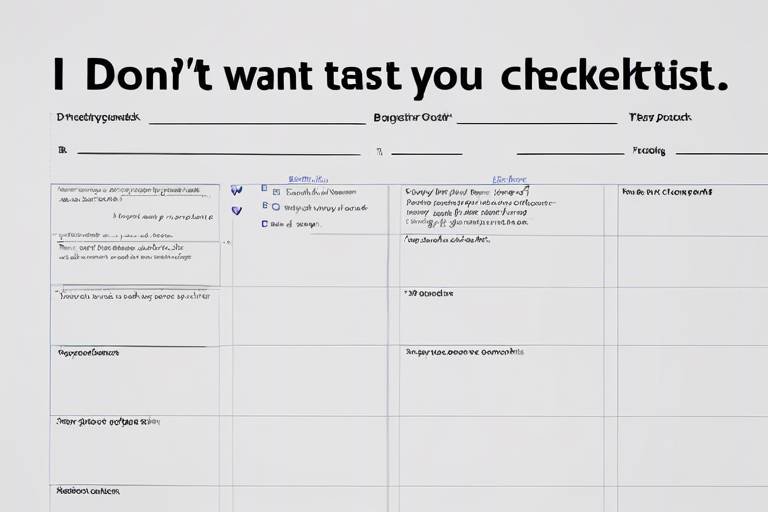How To Leverage AI Tools for Improved Workflow
Artificial Intelligence (AI) tools have become indispensable assets in today's fast-paced business landscape, offering a myriad of opportunities to revolutionize workflow processes across various industries. By harnessing the power of AI technology, organizations can unlock new levels of productivity and efficiency, paving the way for unparalleled growth and innovation.
Understanding the fundamentals of AI technology is crucial for leveraging its full potential in optimizing workflow management. From machine learning algorithms to natural language processing, AI applications are reshaping traditional business operations by automating tasks, analyzing data patterns, and enhancing decision-making processes.
One of the key benefits of integrating AI tools into workflow management is the significant improvement in accuracy and reduction in human error. By leveraging AI-powered data analysis tools, businesses can extract valuable insights from complex datasets, enabling them to make data-driven decisions with confidence and precision.
Automation lies at the heart of AI-driven workflow optimization, empowering organizations to streamline repetitive tasks and allocate resources more efficiently. With AI-powered automation tools, employees can focus on high-value strategic initiatives, leading to increased productivity and overall operational effectiveness.
AI chatbots have revolutionized customer service workflows by providing instant responses, personalized interactions, and round-the-clock support to customers. These intelligent virtual assistants not only enhance customer satisfaction but also free up human agents to handle more complex inquiries, resulting in a seamless and efficient customer service experience.
When it comes to marketing strategies, AI tools offer unparalleled capabilities to optimize campaigns, personalize content, and analyze consumer behavior. By leveraging AI-driven insights, businesses can tailor their marketing efforts to target specific audience segments, drive engagement, and maximize ROI.
AI tools are also instrumental in project management, offering features such as task automation, resource allocation, progress tracking, and risk assessment. By incorporating AI into project management workflows, organizations can ensure smooth project execution, timely delivery, and effective risk mitigation strategies.
Looking ahead, future trends in AI technology are set to further revolutionize workflow optimization by introducing advanced machine learning algorithms, AI-driven decision-making processes, and enhanced automation capabilities. As AI continues to evolve, businesses must stay abreast of these trends to remain competitive and drive sustainable growth.

Understanding AI Technology
Exploring the various ways artificial intelligence tools can enhance productivity and efficiency in different industries, providing insights on implementation strategies and benefits for optimizing workflow processes.
Artificial Intelligence (AI) is a cutting-edge technology that mimics human intelligence, enabling machines to learn from data, adapt to new information, and perform tasks that typically require human intelligence. In the realm of business operations, AI plays a pivotal role in revolutionizing workflow processes by automating tasks, analyzing data at scale, and improving decision-making processes. By harnessing the power of AI tools, businesses can streamline their operations, increase efficiency, and stay ahead of the competition.
One of the fundamental applications of AI in business is its ability to process vast amounts of data quickly and accurately. AI-powered systems can analyze data patterns, identify trends, and generate valuable insights that can inform strategic decision-making. This capability is particularly beneficial for businesses looking to optimize their workflow processes and make data-driven decisions in real-time.
Moreover, AI technology can enhance workflow efficiency by automating repetitive tasks, such as data entry, scheduling, and communication. By delegating these mundane tasks to AI-powered systems, employees can focus their time and energy on more strategic initiatives that require human creativity and critical thinking. This not only boosts productivity but also improves employee satisfaction and job performance.
Additionally, AI tools can facilitate seamless communication and collaboration within teams by providing real-time updates, notifications, and reminders. This fosters a more cohesive work environment and ensures that all team members are aligned on project goals and timelines. By leveraging AI technology for workflow management, businesses can streamline communication channels, optimize task allocation, and enhance overall team productivity.
Understanding the basics of AI technology is crucial for businesses looking to stay competitive in today's fast-paced digital landscape. By embracing AI tools and integrating them into workflow processes, organizations can unlock new opportunities for growth, innovation, and success.

Benefits of AI Integration
When it comes to integrating artificial intelligence (AI) tools into workflow processes, the benefits are truly remarkable. One of the key advantages of AI integration is the significant increase in accuracy it provides. AI-powered systems are capable of processing vast amounts of data with precision, reducing the margin of error that can occur with manual tasks. This heightened accuracy not only improves the quality of work but also enhances decision-making processes within organizations.
Moreover, the integration of AI tools leads to a notable reduction in human error. By automating repetitive tasks and implementing AI-driven solutions, the likelihood of errors caused by human oversight or fatigue is minimized. This not only saves time but also ensures that critical processes are carried out flawlessly, contributing to overall efficiency and productivity.
Another compelling benefit of AI integration is the enhancement of decision-making capabilities. AI tools can analyze data at a speed and scale that surpass human capacity, providing valuable insights and predictions that aid in strategic decision-making. By leveraging AI technology, organizations can make informed choices based on real-time data and predictive analytics, ultimately leading to more effective and successful outcomes.
In addition to these advantages, AI integration can also improve operational efficiency by streamlining workflow processes. Tasks that are time-consuming and repetitive can be automated through AI-powered systems, allowing employees to focus on more strategic initiatives that require human creativity and critical thinking. This shift in focus not only boosts productivity but also fosters innovation within the organization.
Furthermore, the implementation of AI tools can result in cost savings for businesses. By optimizing workflow processes and increasing efficiency, organizations can reduce operational costs and allocate resources more effectively. This cost-effectiveness, combined with the improved productivity and accuracy offered by AI integration, makes it a valuable investment for companies looking to stay competitive in today's fast-paced digital landscape.

AI Tools for Data Analysis
When it comes to data analysis, leveraging AI tools can significantly transform the way businesses operate. These advanced technologies are capable of processing vast amounts of data at incredible speeds, providing valuable insights that can drive informed decision-making. By utilizing AI tools for data analysis, organizations can uncover hidden patterns, trends, and correlations within their data that may not be easily identifiable through traditional methods.
One key benefit of using AI tools for data analysis is the ability to generate real-time insights and predictive analytics. This means that businesses can make data-driven decisions promptly, reacting swiftly to changing market conditions or customer preferences. With AI, companies can anticipate trends, forecast outcomes, and optimize strategies based on accurate and up-to-date information.
Moreover, AI tools can enhance the accuracy and reliability of data analysis processes. By minimizing the risk of human error, organizations can ensure the integrity of their data and the validity of their conclusions. This increased precision can lead to more effective decision-making, improved operational efficiency, and ultimately, better business outcomes.
Additionally, AI-powered data analysis tools can handle complex calculations and computations with ease, freeing up valuable time for employees to focus on more strategic tasks. By automating repetitive data processing tasks, AI can streamline workflow processes, increase productivity, and reduce the burden on human resources. This not only improves operational efficiency but also allows employees to allocate their time and energy to tasks that require creativity, critical thinking, and problem-solving skills.

Automation with AI
Exploring the various ways artificial intelligence tools can enhance productivity and efficiency in different industries, providing insights on implementation strategies and benefits for optimizing workflow processes.
When it comes to automation with AI, the possibilities are endless. Imagine a world where mundane and repetitive tasks are handled effortlessly by intelligent machines, freeing up valuable time for employees to focus on more strategic initiatives. AI-powered automation tools can revolutionize workflow processes by streamlining operations, improving efficiency, and driving productivity to new heights.
By harnessing the power of AI, businesses can automate routine tasks such as data entry, scheduling, and reporting, reducing the margin for error and ensuring consistent results. This not only saves time but also enhances the overall quality of work by eliminating human errors that can occur with manual processes.
Moreover, AI-driven automation can adapt to changing circumstances in real-time, making adjustments and optimizations on the fly. This agility allows businesses to respond swiftly to market changes, customer demands, and internal needs, ensuring operations run smoothly and efficiently at all times.
Imagine a scenario where AI algorithms analyze data, identify patterns, and automatically trigger actions based on predefined rules. This level of automation can significantly improve workflow processes, increase operational efficiency, and drive cost savings by reducing manual intervention and streamlining decision-making.
Ultimately, automation with AI is not just about replacing human tasks but enhancing human capabilities. By offloading repetitive and time-consuming activities to intelligent machines, employees can focus on creative problem-solving, strategic planning, and innovation, leading to a more dynamic and agile workforce.

AI Chatbots for Customer Service
AI chatbots have revolutionized the customer service industry by providing instant responses, personalized interactions, and round-the-clock support to customers. These AI-powered virtual assistants are designed to simulate human conversation and assist users with queries or issues they may have. By leveraging natural language processing and machine learning algorithms, AI chatbots can understand customer inquiries and provide relevant solutions efficiently.
One of the key benefits of using AI chatbots in customer service workflows is their ability to handle a large volume of customer interactions simultaneously without delays. This scalability ensures that customers receive prompt assistance, leading to improved satisfaction levels and enhanced customer experience. Additionally, AI chatbots can be programmed to learn from each interaction, continuously improving their responses and problem-solving capabilities over time.
Moreover, AI chatbots can offer personalized recommendations and suggestions based on customer preferences and past interactions. By analyzing data in real-time, these virtual assistants can tailor their responses to meet individual needs, creating a more personalized and engaging customer service experience. This level of customization can help businesses build stronger relationships with their customers and drive loyalty.
Furthermore, AI chatbots can assist with routine inquiries and basic troubleshooting, allowing human customer service agents to focus on more complex issues that require human intervention. By automating repetitive tasks, AI chatbots free up valuable time for employees to address high-priority tasks, leading to increased productivity and efficiency within the customer service department.

Enhancing Marketing Strategies with AI
Marketing strategies have always been a crucial component of any successful business. With the advancement of technology, artificial intelligence (AI) has emerged as a powerful tool to enhance marketing efforts and drive better results. By leveraging AI tools, businesses can optimize their marketing strategies, personalize content, analyze consumer behavior, and improve overall workflow processes.
One of the key benefits of using AI in marketing is the ability to create personalized experiences for customers. AI tools can analyze vast amounts of data to understand consumer preferences and behavior, allowing businesses to tailor their marketing campaigns accordingly. This personalized approach can lead to higher engagement, increased conversions, and ultimately, improved ROI.
Moreover, AI can help marketers make data-driven decisions by providing valuable insights and predictions. By utilizing AI-powered analytics tools, businesses can gain a deeper understanding of their target audience, identify trends, and optimize their marketing efforts for maximum impact. This data-driven approach can significantly enhance the efficiency and effectiveness of marketing strategies.
AI tools also play a crucial role in automating repetitive tasks, such as email marketing, social media management, and ad targeting. By automating these processes, marketers can save time and resources, allowing them to focus on more strategic initiatives and creative tasks. This automation not only improves efficiency but also ensures consistency and accuracy in marketing campaigns.
Furthermore, AI can revolutionize the way businesses interact with customers through chatbots and virtual assistants. AI-powered chatbots can provide instant responses, personalized recommendations, and 24/7 support to customers, enhancing the overall customer experience. By integrating AI chatbots into marketing workflows, businesses can improve customer engagement and satisfaction levels.
In conclusion, leveraging AI tools for marketing strategies can provide businesses with a competitive edge in today's digital landscape. By harnessing the power of AI to personalize content, analyze data, automate tasks, and enhance customer interactions, businesses can optimize their marketing efforts and achieve better results. As AI technology continues to evolve, the possibilities for enhancing marketing strategies are endless.

AI Tools for Project Management
When it comes to project management, leveraging AI tools can significantly enhance efficiency and effectiveness in handling tasks and resources. These tools offer a wide range of benefits that can streamline project workflows and improve overall project outcomes.
One key advantage of using AI tools in project management is task automation. AI-powered systems can automate repetitive tasks, such as scheduling, reminders, and data entry, allowing team members to focus on more strategic aspects of the project. This automation not only saves time but also reduces the likelihood of human error, leading to smoother project execution.
Moreover, AI tools can assist in resource allocation by analyzing data and identifying the most optimal distribution of resources based on project requirements. This ensures that resources are utilized efficiently, leading to cost savings and improved project delivery timelines.
Tracking project progress is another area where AI tools excel. These tools can provide real-time insights into project status, milestones achieved, and potential bottlenecks, enabling project managers to make informed decisions promptly. Additionally, AI can help in risk assessment by analyzing historical data and predicting potential risks, allowing proactive measures to be taken to mitigate them.
Overall, integrating AI tools into project management processes can lead to enhanced productivity, better decision-making, and improved project outcomes. By harnessing the power of AI, project managers can optimize workflows, allocate resources effectively, and ensure successful project delivery.

Future Trends in AI Workflow Optimization
Exploring the various ways artificial intelligence tools can enhance productivity and efficiency in different industries, providing insights on implementation strategies and benefits for optimizing workflow processes.
As we delve into the future of AI workflow optimization, we are met with a landscape of endless possibilities and innovations. One prominent trend on the horizon is the advancement of machine learning capabilities. With machine learning becoming more sophisticated, AI systems will be able to adapt and learn from data in real-time, leading to even more precise decision-making processes.
Moreover, the evolution of AI-driven decision-making is set to revolutionize workflow optimization. By leveraging AI algorithms to analyze vast amounts of data and generate actionable insights, businesses can make informed decisions faster and with greater accuracy. This shift towards data-driven decision-making will undoubtedly reshape how workflows are managed and optimized.
Another exciting trend to anticipate is the increased automation capabilities offered by AI technologies. With continuous advancements in automation, tasks that were once manual and time-consuming can now be streamlined and executed with efficiency. This not only saves time but also allows employees to focus on strategic initiatives that drive innovation and growth.
In conclusion, the future of AI workflow optimization is bright, with machine learning advancements, AI-driven decision-making, and increased automation capabilities paving the way for a more efficient and productive work environment.
Frequently Asked Questions
- What industries can benefit from AI tools for workflow optimization?
AI tools can benefit a wide range of industries including healthcare, finance, e-commerce, manufacturing, and more. Any industry that deals with data analysis, customer service, marketing, project management, or repetitive tasks can leverage AI for improved workflow efficiency.
- How can AI tools enhance decision-making capabilities in workflow management?
AI tools can enhance decision-making by providing real-time insights, predictive analytics, and data-driven recommendations. By analyzing large datasets quickly and accurately, AI can help businesses make informed decisions that lead to better outcomes and increased efficiency.
- What are the advantages of using AI chatbots in customer service workflows?
AI chatbots can provide instant responses to customer inquiries, offer personalized interactions based on data analysis, and provide 24/7 support. They can handle a high volume of customer queries efficiently, freeing up human agents to focus on more complex issues and improving overall customer satisfaction.
- How can AI tools optimize marketing strategies and workflows?
AI tools can optimize marketing strategies by analyzing consumer behavior, personalizing content, predicting trends, and automating campaign management. By leveraging AI for marketing tasks, businesses can target the right audience, improve engagement, and achieve better ROI on their marketing efforts.
- What are the future trends in AI workflow optimization?
Future trends in AI workflow optimization include advancements in machine learning, AI-driven decision-making processes, increased automation capabilities, and the integration of AI with other emerging technologies like IoT and blockchain. These trends will further revolutionize how businesses streamline their workflows and operations.

















